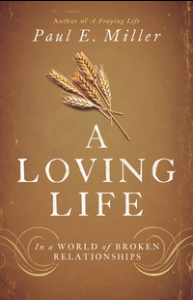 A Loving Life
A Loving Life
By Paul E Miller. Published by Crossway.
There are two areas that it’s difficult for a Christian book to talk about. One is when a topic is so esoteric that it’s difficult to understand why anybody would want to write about it, much less want to read it. Here’s an example I pulled from a Bible college library catalogue: Khaki and the confessional: a study of a religious issue at the 1900 General Election in England.
The second is when a topic is so commonplace that it’s hard to see how you could add something to the general discussion. For example, A Loving Life, by Paul E. Miller, is about love. If there’s anything Christians have heard about, it’s love: we’ve had it defined, redefined, in sermons and in Bible studies, and in the biblical text. Most of us, I think, would be pretty sure we know what love is by now.
But here’s where Miller’s approach is both gentle and wonderful. That is, it’s not a book where love is abstracted and put on an examining table to be poked and prodded as a theoretical example, but a book where love is shown where it should be: in the context of relationships, in the form of a story. As the title points to, Miller examines the nature of love as it is experienced—in life.
He does this through a close reading of the book of Ruth. Each chapter is just a few verses from the short book, accompanied by his exegesis of the text and what it, and its characters, especially Ruth, have to tell us about the true and biblical nature of what love is, and isn’t.
As he points out early on: “The book of Ruth is an ideal narrative for our post-Christian world, where breaking covenants—not enduring in love—is the new norm.”
Miller is the director of seeJesus, a US publisher and trainer of Bible studies, and the approach of somebody who has given thought about how to guide a reader into and through a text is evident throughout. He’s careful with his handling of the text, it’s not burdened with extraneous detail. But where the book really shines is in his pastoral heart, his exegesis of the people within the text, as living, breathing, and, of course, loving.
Just as good is the way that he continues to point to Ruth’s example as an example of love—that is, love not as romantic love, but love as self-sacrificial, costly, and burdensome—but also a mere shadow of what Christ’s love would be for us.
Miller has a keen eye for cultural blind spots (he was the associate director for a mission organisation for some years) and emotional idolatry that often runs unchecked in what we determine love to be. And throughout, Miller’s asides sparkle with gospel-tinted truths, sketching out the gap beyond where the world’s version of love ends, and God’s love begins:
“We’re at ground zero of what makes love possible, of the difference between Disney and Christianity. Disney is groundless human optimism. The gospel is real divine hope—God breaking through into the story of my life, creating resurrection.”
And
“Any time self-will emerges—“I must have this”—an idol lurks underneath. An idol is always, to echo Augustine’s phrase, a love out of balance or a love not rightly ordered. The right order is God at the center and our lesser loves in submission.”
I’d particularly recommend it for those coming from broken relationships who have run aground on jagged ideas about what love is, or is supposed to be. The gentleness and sensitivity of the book might very well be the balm that can help them understand how God can be love, in the midst of a messy world.
If I had to nitpick, I might pick up on the curious American terminology which Miller uses that calls “incarnation” anything to do with being a person with a body (rather than the specific event of Jesus coming in human form, as the Bible does), or a few too many personal anecdotes that don’t particularly illustrate his point. Of bigger concern than those is a needless aside that seems to downplay depression as a genuine illness.
But those don’t really detract from a book that is genuinely on about love in a worthy way: a way that points away from the world’s fairy floss version of love, that tastes good for a mere moment before it disappears, and towards the love of Christ, that lays down in a grave, in order to bring love to us.
Email This Story
Why not send this to a friend?
